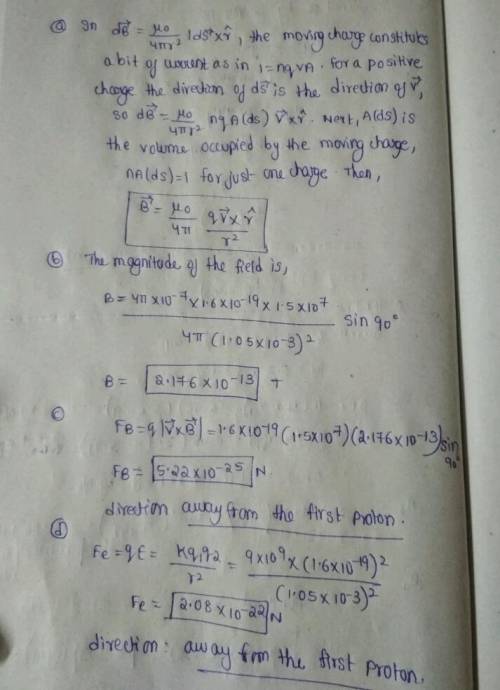
As seen, any object with electric charge, stationary or moving, other than the charged object that created the field, experiences a force in an electric field. Also, any object with electric charge, stationary or moving, can create an electric field. Similarly, an electric current or a moving electric charge, other than the current or charge that created the field, experiences a force in a magnetic field, and an electric current created a magnetic field.
a. To understand how a moving charge can also create a magnetic field, consider a particle with charge q moving with velocity v. Define the position vector r = r. r leading from the particle to some location. Show that the magnetic field at that location is
B= µo/4π= qv x r/r^2
b. Find the magnitude of the magnetic field 1.05 mm to the side of a proton moving at 1.50 x 10^7 m/s.
c. Find the magnetic force on a second proton at this point, moving with the same speed in the opposite direction.
d. Find the electric force on the second proton

Answers: 2


Other questions on the subject: Physics

Physics, 22.06.2019 04:30, Vanesssajohn6294
Which is not true about oxygen-17 and oxygen-18?
Answers: 1

Physics, 22.06.2019 07:30, carlinryan
Which of the following is an example of motion in two dimensions?
Answers: 3

Physics, 22.06.2019 16:50, JeroMii
Two loudspeakers, 5.5 m apart and facing each other, play identical sounds of the same frequency. you stand halfway between them, where there is a maximum of sound intensity. moving from this point toward one of the speakers, you encounter a minimum of sound intensity when you have moved 0.33 m . assume the speed of sound is 340 m/s. part a) what is the frequency of the sound? part b) if the frequency is then increased while you remain 0.21 m from the center, what is the first frequency for which that location will be a maximum of sound intensity? express your answer to two significant figures and include the appropriate units.
Answers: 2

Physics, 22.06.2019 17:20, misstaejailicious200
Which is not true of the intertropical convergence zone? a) it features heavy precipitation b) it's where the trade winds collidec) it's a high-pressure zone with sinking air d) it is also known as the doldrums
Answers: 2
You know the right answer?
As seen, any object with electric charge, stationary or moving, other than the charged object that c...
Questions in other subjects:






Mathematics, 08.03.2021 18:10

Advanced Placement (AP), 08.03.2021 18:10







